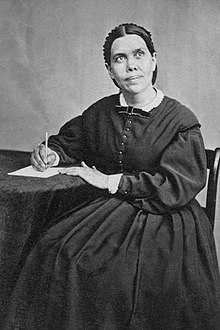
Back إيلين وايت Arabic ايلين وايت ARZ Ellen G. White AST Элен Уайт Byelorussian Елън Г. Уайт Bulgarian Ellen G. White Catalan Ellen G. Whiteová Czech Ellen Gould Harmon White German Ellen G. White DTP Ellen G. White Esperanto
This article may rely excessively on sources too closely associated with the subject, potentially preventing the article from being verifiable and neutral. (September 2024) |
Ellen G. White | |
|---|---|
 Ellen White in 1864 | |
| Personal details | |
| Born | Ellen Gould Harmon November 26, 1827 Gorham, Maine,[1] U.S. |
| Died | July 16, 1915 (aged 87) Elmshaven, St. Helena, California, U.S. |
| Spouse | James S. White |
| Children |
|
| Occupation | Author and co-founder of the Seventh-day Adventist Church |
| Signature | |
| Part of a series on |
| Seventh-day Adventist Church |
|---|
 |
| Adventism |
Ellen Gould White (née Harmon; November 26, 1827 – July 16, 1915) was an American author and co-founder of the Seventh-day Adventist Church. Along with other Adventist leaders such as Joseph Bates and her husband James White, she was influential within a small group of early Adventists who formed what became known as the Seventh-day Adventist Church. White is considered a leading figure in American vegetarian history.[2] Smithsonian named her among the "100 Most Significant Americans of All Time".[3]
White's biographer and grandson, Arthur L. White, estimated that she received over 2,000 visions and dreams from God[4] in public and private meetings throughout her life, which were witnessed by Adventist pioneers and the general public. She verbally described and published for public consumption the content of each vision. The Adventist pioneers viewed these experiences as the Biblical gift of prophecy as outlined in Revelation 12:17[5] and Revelation 19:10,[6] which describe the testimony of Jesus as the "spirit of prophecy". Her Conflict of the Ages series of writings showcases the hand of God in Biblical history and in church history. This cosmic conflict, referred to by Seventh-day Adventist theologians as the "Great Controversy theme", became foundational to the development of Seventh-day Adventist theology.[7] Her book on successful Christian living, Steps to Christ, has been published in more than 140 languages. The book Child Guidance, a compilation of her writings about child care, training and education, has been used as the foundation for the Seventh-day Adventist school system.
White was considered a controversial figure by her critics, and much of the controversy centered on her reports of visionary experiences and on the use of other sources in her writings. Historian Randall Balmer has described White as "one of the more important and colorful figures in the history of American religion".[8] Walter Martin described her as "one of the most fascinating and controversial personages ever to appear upon the horizon of religious history".[9] Arthur L. White, her grandson and biographer, wrote that Ellen G. White is the most translated female non-fiction author in the history of literature, as well as the most translated American non-fiction author overall.[10] Her writings covered a broad range of subjects, including religion, social relationships, prophecy, publishing, nutrition, creationism, agriculture, theology, evangelism, Christian lifestyle, education, and health. She advocated vegetarianism. She promoted and has been instrumental in the establishment of schools and medical centers all over the world, with the most renowned being Andrews University in Michigan and the Loma Linda University and Medical Center in California.
During her lifetime she wrote more than 5,000 periodical articles and 40 books. As of 2019[update] more than 200 White titles are available in English, including compilations from her 100,000 pages of manuscript published by the Ellen G. White Estate, which are accessible at the Adventist Book Center. Her most notable books are Steps to Christ, The Desire of Ages and The Great Controversy.
- ^ Daily, Steve (October 12, 2020). Dr. Page Publishing, Inc. p. 364. ISBN 978-1647018771.
- ^ "History of Vegetarianism – Ellen G. White (1827–1915)". ivu.org. Retrieved February 6, 2020.
- ^ Frail, T. A. (November 17, 2014). "Meet the 100 Most Significant Americans of All Time". Smithsonian. Retrieved February 2, 2018.
- ^ "Ellen G. White Biography". Ellen G. White Estate. Retrieved November 21, 2018.
- ^ Revelation 12:17
- ^ Revelation 19:10
- ^ Douglass 2010, p. 416.
- ^ Balmer 2002, pp. 614–615.
- ^ Martin 1965, p. 379.
- ^ White 2000.